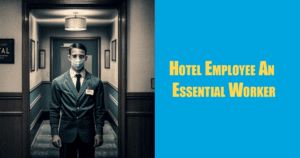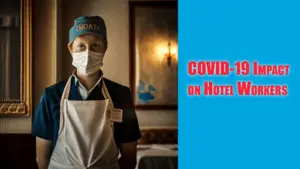An essential worker is an employee assigned to work during a business closure to meet operational needs. The state determines essential worker designation, their responsibilities, and the reasons for closure. During the COVID-19 pandemic, they played an integral role in community safety, health, and well-being. They were responsible for various operating services, including healthcare needs, emergency provisions, grocery delivery, and many other facilities. Among different employment categories, hotel employees were part of essential critical infrastructure workers. Despite the profound impact of the pandemic on hotel employees, they adapted to new circumstances and engaged with guests virtually. But is a hotel employee an essential worker? Let us have a detailed discussion on this perspective.
Essential Worker Status for Hotel Employees
Hotels provide various job opportunities, most of which do not require a four-year degree. To consider a hotel employee an essential worker depends on many conditions. The definition of an essential worker depends on location too.
Essential workers provide critical services and perform tasks to maintain safety, health, and welfare. But an unemployed hotel worker may not be considered an essential worker like an emergency or health care worker.
Under the latest federal guidance of the CDC (Centre for Disease Control and Prevention), traveler accommodation gets prioritized in the essential worker section. It removed hotel workers from Phase 1c. According to the CDC, hotel workers are essential workers.
An essential worker should minimize physical contact between colleagues and customers. Maintain health, safety measures, and hygiene. During the period of alert level 4, a worker should perform only necessary activities and restrict other activities.
Front-line Hotel Workers and Essential Worker Status
Front-line workers perform basic essential operations of society during a crisis like war, disaster, or pandemic. Front-line workers have a critical role. Healthcare, law enforcement, food production and distribution, and emergency services are a few areas where front-line workers are employed. Selected working staff who need to work during business closure to meet operational needs are essential workers.
About 70% of the global workforce are front-line workers. They directly interact with the customer. This workforce directly impacts product performance and customer care. Front-line workers’ job is outside their home, which exposes them to direct risk.
Essential services are delivered via front-line workers in hotels and other accommodations for the proper and smooth functioning of the hotels. However, all essential workers are not front-line workers.
COVID-19 Impact on Hotel Workers
The impact of novel covid-19 was evident in every industry. The coronavirus epidemic and subsequent lockdowns disrupted workers’ lives across different sectors. These disruptions highlighted the vulnerability and precarious employment status of some workers. The workers in the hotel industry had one of the hardest hits. About 50 million jobs could be lost worldwide in the travel and tourism sector due to COVID-19. Eventually, the pandemic had a massive impact on hotel workers. There was no job security for hotel workers during crisis like COVID-19.
- Job security- The demand for hotel rooms decreased due to travel restrictions. It forced many hotel to close down or reduce its operations, contributing to job loss. There was not much job security for hotel workers during the Covid-19 crisis. The global pandemic continues to affect the hotel industry. Consequently, many hotel workers are unsure about their job.
- Reduced hours and pay- Most of the hotels reduced their working hours and payments of their employees to make cost-cutting possible.
- Emotional trauma- Besides the work-related stress, the covid pandemic triggered mental and emotional distress. Some employees faced high rates of job uncertainty that contributed to their socioeconomic misery.
During the lockdown and closing of the nation’s borders, there was a substantial change in employee salaries, work schedules, and working hours. Now, hotels should become more customer-focused, pay more attention to health and safety, and regularly update their communication channels. Not only this, they should prioritize digitalization and take necessary actions for human resource development and recovery.
Labor Laws for Hotel Employees as Essential Worker
Labor laws for hotel employees differ from location to location. These laws depend on the location of the hotel.
FLSA ensures Fair Labour Standards across the state
FLSA sets a minimum wage which is $7.25 per hour. Non-exempt workers must get paid their extra payment in small hotels too. If the yearly sales revenue is more than $5000000, then your hotel should pay the federal minimum wage of the employee. If your company does not meet the $5000000 threshold, you are subject to the provision, provided that your occupation is closely related to such commerce.
Equal Employment Opportunity Commission (EEOC)
EEOC protects workers from discrimination in the workplace. If the hotel hires 15 or more 15 employees, everyone will work 20 calendar weeks. This law gets violated if you discriminate during the hiring or while compensating different employees performing a task.
Uniformed Services Employment and Reemployment Rights Act (USERRA)
It states that hotels and resorts should re-employ workers after they are done with their duties. Further, if an employer discriminates, then it violates the law.
Family and Medical Leave Act(FMLA)
Hotels and other accommodations need to employ more than fifty workers so that they are covered under FMLA labor laws for hotel employees. Companies under FMLA need to grant 12 weeks of unpaid leave to workers who are with them for twelve months. These leaves are for birth and child care for newborn babies and care for family members of the employees who have severe health conditions or need to take medical leave due to their medical condition.
Employee Polygraph Protection Law
According to this law, an employer cannot force a worker to take a lie-detecting test. Employee Polygraph Protection Law also ensures that if a worker does not take a lie-detecting test, the employer cannot discriminate against them.
It is essential for both workers and employers to be aware of and should agree to these laws to have a safe and healthy workplace.
Rights of Hotel Employee as Essential Worker
Essential workers are required to work in times of crisis or emergency. They play a significant role in operating the hotel facility smoothly and serving essential services. Here are a few rights of essential workers in the hotel industry :
- Health and Safety- To have a healthy and safe workplace is the right of essential workers in the hotel industry. Employers should take necessary actions and precautions to reduce exposure to the viruses like COVID-19. The employer should offer safety gear, training, and protective clothing.
- Paid leave- It is the right of essential workers in the hotel industry to have paid leave under federal, state, and local laws.
- Hazard duty pay- Hazard pay refers to the additional payment for working in high-risk areas.
- Collective Bargaining- Another right of the essential workers in the hotel industry is to form or join unions for collective bargaining. It enables them to negotiate better wages, working conditions, etc.
Ensuring Proper Classification and Protection for Hotel Employees as Essential Worker
Every worker in every field of the industry should receive protection against unfair means and practices. However, this is possible by proper classification of the employees. It is critical to ensure proper classification and protection for hotel employees to protect their rights and enjoy fair and just workplace treatment.
Here are some significant steps hotels can take to accomplish this:
Classification of Hotel Employees as Essential worker
Hotel employees must be correctly classified as either employees or independent contractors, as this determines their legal rights and benefits. To avoid potential legal consequences, employers should follow state and federal regulations when determining the classification and avoid misclassifying workers.
Affordability of compensation and benefits
Hotel employees should be fairly compensated and provided with fair benefits. For instance, their perks should include healthcare, vacation period, and sick leave. On the contrary, employers must comply with all applicable wage and hour laws, including minimum wage and overtime pay.
Protection against harassment
Employees in hotels also require protection from workplace harassment and discrimination. Employers should have clear policies in place, and if any employee reports such behavior, they should take appropriate action.
Training
Hotels primarily use a high-performance work system and service-oriented HRM practices to enhance employee performance. They should get better training and professional development opportunities to improve their skills and advance their careers in the industry.
Conclusion (Is a hotel employee an essential worker?)
In 2020, covid spread at an alarming rate, creating pathetic situations worldwide. Though it affected all industries, the hotel industry was among the hardest-hit sectors. Hotels had to deal with massive cancellations of reservations and accommodations. They had to pay salaries despite not earning a dime. While the impact of covid on the hospitality industry was evident, hotel employees suffered at organizational and family levels. They were anxious about their jobs, finances, family demands, living alone, relationships, and living conditions. The employees’ perceived performance and well-being were high at hotels that successfully uplifted their physical, psychological, and social resources. Now that pandemic-related conditions are improving, hotels should support the rights of hotel employees. After all, the success of the hospitality industry depends on customer experience, which can be achieved only by our essential workers.



